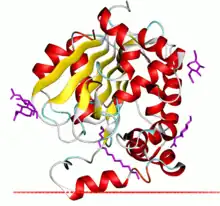Palmitoyl(protein) hydrolase
Palmitoyl protein hydrolase/thioesterases is an enzyme (EC 3.1.2.22) that removes thioester-linked fatty acyl groups such as palmitate from modified cysteine residues in proteins or peptides during lysosomal degradation. It catalyzes the reaction
- palmitoyl[protein] + H2O palmitate + protein
| Palmitoyl protein thioesterase | |||||||||
|---|---|---|---|---|---|---|---|---|---|
 Palmitoyl protein thioesterase 1. Red plane shows hydrocarbon boundary of the lipid bilayer | |||||||||
| Identifiers | |||||||||
| Symbol | Palm_thioest | ||||||||
| Pfam | PF02089 | ||||||||
| Pfam clan | CL0028 | ||||||||
| InterPro | IPR002472 | ||||||||
| SCOP2 | 1exw / SCOPe / SUPFAM | ||||||||
| OPM superfamily | 127 | ||||||||
| OPM protein | 1eh5 | ||||||||
| |||||||||
| palmitoyl [protein] hydrolase | |||||||||
|---|---|---|---|---|---|---|---|---|---|
| Identifiers | |||||||||
| EC no. | 3.1.2.22 | ||||||||
| CAS no. | 150605-49-5 | ||||||||
| Databases | |||||||||
| IntEnz | IntEnz view | ||||||||
| BRENDA | BRENDA entry | ||||||||
| ExPASy | NiceZyme view | ||||||||
| KEGG | KEGG entry | ||||||||
| MetaCyc | metabolic pathway | ||||||||
| PRIAM | profile | ||||||||
| PDB structures | RCSB PDB PDBe PDBsum | ||||||||
| Gene Ontology | AmiGO / QuickGO | ||||||||
| |||||||||
This enzyme belongs to the family of hydrolases, specifically those acting on thioester bonds. The systematic name is palmitoyl[protein] hydrolase. Other names in common use include palmitoyl-protein thioesterase, and palmitoyl-(protein) hydrolase. This enzyme participates in fatty acid elongation in mitochondria.
Neuronal ceroid lipofuscinoses (NCL) represent a group of encephalopathies that occur in 1 in 12,500 children. Mutations in the palmitoyl protein thioesterase gene causing infantile neuronal ceroid lipofuscinosis.[1] The most common mutation results in intracellular accumulation of the polypeptide and undetectable enzyme activity in the brain. Direct sequencing of cDNAs derived from brain RNA of INCL patients has shown a mis-sense transversion of A to T at nucleotide position 364, which results in substitution of Trp for Arg at position 122 in the protein - Arg 122 is immediately adjacent to a lipase consensus sequence that contains the putative active site Ser of PPT. The occurrence of this and two other independent mutations in the PPT gene strongly suggests that defects in this gene cause INCL.
Examples
Human proteins containing this domain include:
|
| ||||||||||||||||||||||||||||||||||||||||||||||||||||||||||||||||
Structural studies
As of late 2007, 4 structures have been solved for this class of enzymes, with PDB accession codes 1EH5, 1EI9, 1EXW, and 1PJA.
See also
References
- Hofmann SL, Vesa J, Hellsten E, Verkruyse LA, Camp LA, Rapola J, Santavuori P, Peltonen L (1995). "Mutations in the palmitoyl protein thioesterase gene causing infantile neuronal ceroid lipofuscinosis". Nature. 376 (6541): 584–587. Bibcode:1995Natur.376..584V. doi:10.1038/376584a0. PMID 7637805. S2CID 4322423.
Further reading
- Camp LA, Hofmann SL (1995). "Assay and isolation of palmitoyl-protein thioesterase from bovine brain using palmitoylated H-Ras as substrate". Methods Enzymol. Methods in Enzymology. 250: 336–47. doi:10.1016/0076-6879(95)50083-9. ISBN 978-0-12-182151-7. PMID 7651163.
- Schriner JE, Yi W, Hofmann SL (1996). "cDNA and genomic cloning of human palmitoyl-protein thioesterase (PPT), the enzyme defective in infantile neuronal ceroid lipofuscinosis". Genomics. 34 (3): 317–22. doi:10.1006/geno.1996.0292. PMID 8786130.
- Verkruyse LA, Hofmann SL (1996). "Lysosomal targeting of palmitoyl-protein thioesterase". J. Biol. Chem. 271 (26): 15831–6. doi:10.1074/jbc.271.26.15831. PMID 8663305.
External links
- Palmitoyl+Thioesterase at the U.S. National Library of Medicine Medical Subject Headings (MeSH)
- GeneReviews/NCBI/NIH/UW entry on Neuronal Ceroid-Lipofuscinoses